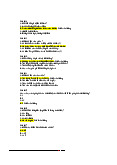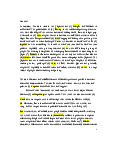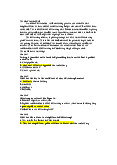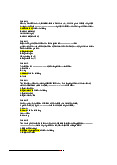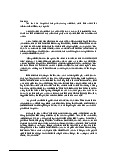



















Preview text:
English File third edition
Intermediate Plus Student’s Book answer key 1A Page 4 Exercise 1b 1 Sean ✓ 2 Deborah 3 James ✓ ✓ 4 Philippa ✓ Page 4 Exercise 1c 1 Sean H –
e was named after the actor Sean Connery, who played James Bond in the 60s. Deborah
– She9s named after the hospital where she was born. James H –
e thinks his parents just liked the name. Philippa H –
er parents liked it because it was an uncommon name. 2 Sean
– His nickname was 8Brains9 at school. Deborah
– She9s called Debbie or Deb for short. James H –
e was called Jim for short at university. Philippa S
– he was called Pippa for short when she was young. 3 Sean
– He likes his name and definitely wouldn9t change it. Deborah
– She isn9t really happy with her name. She tried changing it when she was
little but doesn9t like the names she chose either. James
– He9s always liked his name. He wouldn9t change it. Philippa S
– he hated it when growing up, but now i
t9s OK. She wouldn9t change it. Page 4 Exercise 2a 1 fish /ɪ/ Brian 2 tree /i / ː Emily 3 cat /æ/ Adrian 4 horse /ɔ:/ Charlotte 5 egg /e/ Leo 6 train /eɪ/ Sam 7 phone /əʊ/ Robert 8 bike /aɪ/ Liam Page 4 Exercise 2b 1
Chris B (short for Christopher M or Christina / Christine / Christobel W), Bill M
(short for William), Olivia W, Brian M 2
Peter M, Steve M (short for Stephen / Steven), Emily , E W ve W (also short for Eva / Evelyn) 3
Alex B (short for Alexander M or Alexandra W), Adrian M, Andrew M, Ann W 4
Sean M, George M, Paula , C W harlotte W 1 5
Adele W, Ben M (short for Benedict / Benjamin), Leo M (short for Leonard /
Leonardo), Jessica W 6
Sam B (short for Samuel M or Samantha W), Grace W, James M, Kate W (short
for Catherine / Katherine / Kathryn) 7
Tony M (short for Anthony / Antony), Joe M (short for Joseph), Robert M, Sophie W 8
Ryan M, Liam M, Michael M, Simon M Page 4 Exercise 2d
Adams /ˈædəmz/
Evans /ˈevənz/
Harrison /ˈhærɪsn/
Johnson /ˈdʒTnsn/
Jones /dʒəʊnz/
Mason /ˈmeɪsn/
Murray /ˈmʌri/
Taylor /ˈteɪlə/
Walker /ˈwɔːkə/ Wright /raɪt/ Page 4 Exercise 3b 1 C How people see you 2 E Success at school 3 B Names and careers 4 A Life expectancy
not required D Popular names in history Page 4 Exercise 3c 1
People called Elizabeth are seen as the most successful, Sophie as the most
attractive, and Ann as less successful, less lucky, and less attractive. 2
Names that are considered attractive (e.g. Sophie and Ryan) or first names
beginning with the letters A or B (in the US). 3
Ellie sounds like the beginning of electrician, and people are often attracted to
jobs that sound like their names. 4
Some employers prefer applicants with 8normal9-sounding names, so an unusual
name might be a disadvantage. 5
You should have 8positive9 initials, like J.O.Y. or F.U.N. Page 5 Exercise 3e 1 researchers 2 evidence 3 survey 4 the average 5 scale 6 rank 7 likely 2 8 Overall 9 beyond Page 5 Exercise 3f 1 Researchers 2 evidence 3 survey 4 the average 5 scale 6 rank 7 likely 8 Overall 9 beyond Page 6 Exercise 6a
Samsung /ˈsæmsʌŋ/ makes electronic products Nike /ˈna k ɪ iː/
ː makes trainers and sportswear
Sony /ˈsəʊniː/ makes electronic products
Google /ˈɡuː l
ɡ / makes internet-related services and products
IKEA /aɪˈkɪə/ makes ready-to-assemble furniture Page 6 Exercise 6b 1 Nike 2 IKEA 3 Samsung 4 Google 5 Sony Page 6 Exercise 6c 1
They stand for the initials of Ingvar Kamprad, IKEA9s founder. 2
Samsung originally sold fish, vegetables, and fruit to China. 3
Nike9s original name was Blue Ribbon Sports. 4
They chose Sony because it has an interesting meaning (a combination of 8sonus9,
the Latin word for 8sound9, and 8sonny9, US slang for 8boy9). Also, it9s easy for people
all over the world to pronounce. 5
8Google9 the company is spelled G-O-O-G-L-E, but the number (where the name
comes from) is spelled G-O-O-G-O-L. Page 6 Exercise 6d the iMac and the Kindle Page 6 Exercise 6f 1
Michael Cronan, an American designer 2
Jeff Bezos told Cronan that he didn9t want a high-tech name. 3 3
It means 8to light a fire9. 4
Cronan thought that this would remind people of the excitement they feel when
they are enjoying their favourite book. The name was also inspired by a line from the
French novelist Victor Hugo: 8to read is to light a fire9. Page 6 Exercise 6h 1
Ken Segall, an advertising executive in New York City 2
Steve Jobs asked for a name that had 8Mac9 or 8Macintosh9 in it. He also wanted
the name to show people that they could go online more easily with the new computer. 3
8Mac9 stands for 8Macintosh9 because there was already a range of Macintosh
computer. The 8i9 was for 8internet9, but it could also mean 8individual9 or 8imagination9. 4
Yes. Segall and his team thought of dozens of names first, and Steve Jobs wanted it to be called 8MacMan9. Page 7 Exercise 7a 1
him = Cronan; he = Bezos 2
them = Amazon9s customers 3 it = a new name 4
it = the name; him = Jobs 1B Page 8 Exercise 1c
moody: happy one minute and sad the next, and often bad-tempered
restless: unable to stay still or be happy where they are, because they9re bored or need a change
selfish: care only about themselves and not about other people
sensitive: can be easily hurt or offended
sociable: enjoy spending time with other people Page 8 Exercise 2a 1 gla|mo|rous 2 po|sse|ssive 3 re|be|llious 4 comfor|ta|ble 5 cre|a|tive 6 lu|xu|ri|ous 7 en|vi|ous 8 im|pre|ssive 9 un|heal|thy 10 sui|ta|ble Page 9 Exercise 3b 1 A 4 2
Wendy wasn9t happy with the way she looked. She wore black a lot and was
bored with it but didn9t know what to do. Her colleague (who had done colour analysis)
always looked stylish and well dressed, so Wendy decided to try it. 3 She felt glamorous. Page 9 Exercise 3c 1 T 2 F 3 F 4 T 5 F 6 F 7 T 8 T 9 T 10 F Page 9 Exercise 3d 2
She went with two friends. 3
The colour consultant draped scarves on her; Wendy didn9t actually try on any clothes. 5
Winter people should wear strong clothes like dark purple and dark blue. 6
She still wears black once or twice a week. 10
Her mother has done colour analysis; her husband hasn9t done it yet. Page 10 Exercise 4a 1 most 2 than 3 ones 4 in 5 more 6 much 7 as 8 the Page 10 Exercise 5d 1 Cabbage White 2 Dead Salmon 3 Monkey Puzzle 4 Arsenic PRACTICAL ENGLISH 1 Page 12 Exercise 1a
Andrew helps Jenny when she drops her bags, and carries one of them for her. 5
Her suitcase hasn9t arrived. Page 12 Exercise 1b 1 T 2
F (He was doing research.) 3 F (He9s working in Alaska.) 4
T (Sts will later discover that in fact although Andrew gives Jenny back the
laptop case, it is not her laptop, but for the moment they should believe that it is hers.) 5
F (His surname is Page.) 6 T Page 12 Exercise 2a 1 ten days 2
greyish blue and hard plastic; medium size with wheels; it has a small lock and a
label with her name and phone number on it 3
clothes, toiletries, and all her personal belongings 4 up to 24 hours Page 12 Exercise 2b A
Which flight were you on? A
I9ll take your details and then I can issue you with a reference number. Can I have your name, Please? A
And you9re a visitor to the UK. A
How long are you staying for? A
OK. How many bags are you missing? A
Can you describe it for me? A
And what size is it? A
And what was in the suitcase? A
Can I have your address in the UK? A
And a contact number? A
And finally, can you sign this? A
It9s possible. We9re very sorry for the inconvenience. Here9s your reference number.
You can track the progress of your luggage online, or just give us a call. But we should be
able to get it back to you within 24 hours. Page 13 Exercise 3a
Her laptop isn9t working properly, possibly because of a virus. Page 13 Exercise 3b 1 her bags 2
No, he isn9t because it9s been snowing all day and he hasn9t left the hotel. 3 tea 4 Henry9s 5 Rob9s cousin 6
Tomorrow, so that he can fix her computer. 7 a pair of his pyjamas 6 Page 13 Exercise 3d
Henry (And) it9s lovely to see you.
Jenny It9s great to see you too.
Henry No, no, let me take that.
Henry You9ve had a hard journey. Allow me.
Jenny It9s weird, isn9t it?
Rob I really miss you.
Jenny Oh no! That9s awful.
Rob It9s not your day, is it?
Rob Oh wow! You9ll look great in those, Jenny. 2A Page 14 Exercise 1a Backpack headphones mobile phone phone charger sunglasses camera bottle of water Suitcase laptop pyjamas trainers (guide)book hairdryer wash bag 1
laptop, wash bag (liquids and creams must be taken out and put in a plastic bag) 2 bottle of water Page 14 Exercise 1f 10 passports 9 flip flops 8 mobile phone 7 toothbrushes 6 toothpaste 5 sunglasses 4 a good book 3 sunscreen 2 phone chargers 1 comfortable shoes Page 14 Exercise 2a 7
The pink letters in scissors have the following sounds: (in order) /s/, /z/, /z/ (/ˈsɪzəz/) Page 14 Exercise 2c
snake /s/ flip flops, massage, passport, safari, sunset, swimsuit
zebra /z/ bags, cruise, holidays, pyjamas, razor, towels Page 14 Exercise 2e
s is never pronounced /z/ when it is at the beginning of a word. Page 15 Exercise 3a 1 B 2 E 3 D 4 A 5 C Page 15 Exercise 3b She9s mainly negative. Page 15 Exercise 3c 1 b scissors and razors 2
c thinks it9s just a routine part of her job 3
a meeting all sorts of people 4 c are slow 5
b the job is very repetitive 6 c they don9t know the rules 7 a early in the morning Page 16 Exercise 5a 1
I9m wearing (It9s happening now.) 2 I look ( i
look like s a non-action verb, not normally used in the continuous) 3
✓ (Both the present simple and present continuous can be used to talk about
future events that are part of a timetable.) 4
I9m reading (It9s happening now.) 5
I9m having (have is an action verb here, and is in the continuous to show the
action is happening now) Page 16 Exercise 5e Holidays
Do you prefer summer holidays or winter holidays? Why?
Are you planning a holiday at the moment? Which places are you thinking about? What do you want to do there? 8 Weekends
What do you usually do at the weekend?
What are you doing this weekend? Today
What time does this class finish? Where are you going after class today?
What are you doing this evening? Where are you having dinner? Page 16 Exercise 6b 1
enjoy doing sport on holiday the Greeks 2
love sunbathing the Germans 3
almost never sunbathe on holiday the Americans 4
drink more alcohol than usual on holiday the British 5
are the world9s best tourists the Japanese (followed by the British) 6
are considered very polite the Japanese, the British, the Germans 7
leave the worst tips the French 8
leave the most generous tips the Americans (followed by the British, the Germans, and the Japanese) 9
make a lot of noise the Americans, the Italians, and the Spanish 10
dress well when they are on holiday the Italians and the French 2B Page 18 Exercise 1c 1 a DIY store and a hypermarket
A DIY store is a shop that sells things to improve your home, e.g. paint, tools. These are
often large stores similar to hypermarkets.
A hypermarket is a very large shop located outside a town that sells a wide range of goods. 2
a stationer9s and a newsagent9s
A stationer9s is a shop that sells stationery (= paper, envelopes, etc.).
A newsagent9s is a shop that sells newspapers and magazines. 3
a dry cleaner9s and a launderette
A dry cleaner9s is a place where you can have clothes cleaned, usually with chemicals.
A launderette is a place where you can wash and dry clothes in coin-operated washing machines. 4
an estate agent9s and a travel agent9s
An estate agent9s is a business that sells houses and flats for people.
A travel agent9s is a business that makes travel arrangements for people, e.g. by buying
plane tickets and booking hotel rooms. 5
8the shop9s closing9 and 8the shop9s closing down9
8the shop9s closing9 = The shop stops operating for a period of time, e.g. until the next
day; 8the shop9s closing down9 = The shop stops doing business permanently. Page 19 Exercise 2b
Many high streets have changed because some shoppers are going to hypermarkets and
malls; shops are also closing down because of the recession. 9
Some towns are offering free parking, live music, theatre performances; some are
encouraging 8pop-up shops9 in empty shop spaces. Page 19 Exercise 2c
Bea: She says the small shops in the centre of Valencia are doing quite well. Page 19 Exercise 2d Harry Kate Ken Bea
1 Where do you Hereford, UK, Toronto, Kobe, a city in centre of live? a small town Canada Japan Valencia, Spain near Wales 2 What shops chains and lots of shops,
small shops and lots of small are there near some smaller e.g. corner shops shops and a big you? shops, e.g. a delicatessens, near train department butcher9s pharmacies, station store, some grocery stores, chains. (The and chains shopping centres are out of town.) 3 What9s Local shops They9re They9re They9re doing happening to having struggling disappearing quite well. small shops in problems; because people because most Some close your area?
plans for a new go to indoor people shop at down but then Why? Do you shopping
shopping malls department new ones open think this is a centre outside or stores for up. Shopping good or bad town w – ill kill supermarkets, convenience. centres round thing? the high street; especially in Better things Valencia too more people
winter. Doesn9t are replacing far away. are shopping say if she
them; it9s what Tourists like online. He9s thinks this is shoppers want. small shops. worried the good or bad. She likes small town centre shops, but says will die. it9s impractical that they close at lunchtime. They also can9t offer the service larger stores can, e.g. delivery and refunds. Page 20 Exercise 3a 1 ✗ children9s books 2 ✓ 3 ✓ 10 4
✗ your husband9s new car 5
✗ my mother9s birthday 6 ✓ 7
✗ the beginning of the film 8 ✗ my own flat Page 20 Exercise 4b Maria9s mother 2 Philip9s phone 1 Tom9s train 2 my wife9s work 1 Max9s motorbike 3 Mr Smith9s salary 1 my neighbours9 new dog 2 George9s job 3 Page 20 Exercise 5b
The founders called the website NotOnTheHighStreet.com to show it was a place where
you could discover unique products that are usually sold in markets and craft fairs, not in high street shops. Page 21 Exercise 5c 1
B What sort of products do you make and sell? 2
F Where did you start your company and where do you work now? 3
G When did you set up your business and why? 4
A What are your ambitions for the future? 5
E How is your health now? 6
C How does the place where you live influence your products?
not required D Do you also sell in shops or only from the website? Page 21 Exercise 5d 1 AB 2 KW 3 EC 4 AB 5 EC 6 KW 1&2 REVISE AND CHECK Page 22 Grammar 1
I emailed her the photos. (b) 2
What are their surnames? (c) 3
He made coffee for me. (b) 4
My sister lent them to us. (a) 11 5
The red shoes are nice, but I prefer those blue ones. (c) 6
He9s the bossiest man I9ve ever met. (a) 7
She9s much happier in her new job than she was before. (c) 8
The film was a bit better than the book. (a) 9
I don9t believe a word he says. (b) 10
You look worried – what are you thinking about? (a) 11
Where are you going on holiday this summer? (b) 12
We9re visiting our grandparents next weekend. (a) 13 I love looking at other f
people9s amily photos. (a) 14
What9s the name of the village where you were born? (c) 15
We grow all our own vegetables. (b) Page 22 vocabulary Exercise a 1 glamorous 2 moody 3 childish 4 sensible 5 creative 6 suitable 7 luxurious 8 stressful 9 risky 10 impressive Page 22 Vocabulary Exercise b 1 insect repellent? 2 safari 3 package 4 sunburnt 5 pack 6 memory card 7 guided 8 swimsuit. Page 22 vocabulary Exercise c 1 butcher9s 2 newsagent9s 3 baker9s 4 florist9s 5 chemist9s 6 estate agent9s 7 fishmonger9s
Page 22 Pronunciation Exercise a 1 baker9s 2 butcher9s 12 3 memory 4 sights 5 delicious
Page 22 Pronunciation Exercise b 1 im|pul|sive 2 sight|see|ing 3 pro|fi|ta|ble 4 am|bi|tious 5 news|a|gent9s
Page 23 Can you understand this text Exercise b 1
C They tend to prefer busy, lively places 2
F Although they prefer not to travel alone 3
B They often go back to the same holiday destination again and again 4
D They love telling others where they have been 5
A They tend to have strict time and money budgets
not required E They often go on holiday with large groups of friends
Page 23 Can you understand these people 1 country. (c) 2 her mother. (b) 3
red and green. (a) 4
watching the rain. (a) 5
she doesn9t like all the people in the malls. (b) 3A Page 24 Exercise 1b 1 a 8girly9 girl 2 being naughty 3 quarrelling 4 a bookworm 5 a tomboy 6 a well-behaved child Page 24 Exercise 1c
Sarah has changed the most. Laura has changed the least. Page 24 Exercise 1d 1
I used to spend (8I was spending9 isn9t possible because his love of toy cars was a
long-term habit, not an action in progress at a specific time in the past) 2
I was wearing (8I used to wear9 isn9t possible because this isn9t referring to an
extended period of time in the past) 13 3
I used to be (8I was being9 isn9t possible because her shyness was true for a
significant period of time, not just a moment in the past) 4
I started (8I used to start9 isn9t possible because she started university on one
occasion only, not several times in the past) Page 25 Exercise 2b 1 /ɪd/ 2 /t/ 3 /d/ 4 /d/ 5 /t/ 6 /ɪd/ Page 25 Exercise 2d 1
I worked as a waiter last summer. Pa 2
We play role games on Saturday nights. Pr 3
We lived in America for six months. Pa 4
We watched a lot of TV last night. Pa 5
I usually cook at weekends. Pr 6
I look like my sister. Pr Page 25 Exercise 2f 1 Where were you born?
Where did you live w
hen you were a child? 2
How old were you when you started pr imary school? Did e
you njoy your first day? What did you do? 3
When was the first time you travelled a broad? Where did you ? go 4
When was the last time you cooked a meal for friends?
What did you make? Did your friends like i t? 5
When was the last time you visited relatives?
Who did you visit? What did you do? Page 26 Exercise 3a 1 in his late forties 2 a baby 3 a pensioner 4 a toddler 5 a child 6 a teenager 7 in her mid-thirties 8 in his early twenties 9 a pre-teen Page 26 Exercise 4b 1
Almost everyone under 25 14 2
No, they weren9t. Page 26 Exercise 4c
The sound is being used to keep teenagers away from certain places, such as shopping centres.
Not everybody thinks it9s a good idea. Some people think it could be harmful, and that
it doesn9t solve the problem; it just drives teenage gangs to other places. Page 26 Exercise 4d 1
annoy other customers or frighten them away 2 has worked very well 3 hurt the teenagers. 4 ban the Mosquito Tone 5
a ringtone for mobile phones. 6
receive calls and messages in class without the teacher knowing. Page 27 Exercise 5c Student A 1
Teenagers under 16 will be banned from the centre of Bangor in Wales at night. 2
Crime and anti-social behaviour 3
Anybody under the age of 16, sports groups, youth centres, churches 4
It might help to reduce the number of robberies in the area. 5
People say it treats all young people like criminals. Student B 1
Cinemas in Brooklyn, New York are putting on early afternoon film sessions. 2
The difficulty of walking in streets full of mothers and babies in buggies 3
Ordinary people watching films at that time. 4
Parents can watch films without having to call in a babysitter. 5
The films are quieter than usual and films with loud noises aren9t usually shown.
It can still be difficult to hear the film because of screaming babies. Student C 1
Malaysia Airline has decided to ban children under 12 from first class and from
the top deck of A380 planes. 2
Passengers who bought expensive tickets complained about crying children. 3
Families travelling with children 4
Adult travellers can relax without hearing crying and screaming. 5
Families travelling with children will only be able to sit in economy. Page 27 Exercise 5d Student A 1 curfew 2 anti-social behaviour 3 banned 4 fine Student B 15
